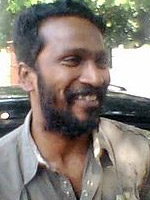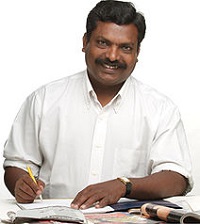
Showing all artists born at Cuddalore
Vetrimaaran
Vetrimaaran is an Indian film director, working in the Tamil film industry. He made his directorial debut with the critically acclaimed Polladhavan (2007). His second feature film Aadukalam (2011) won five National Film Awards, with Vetrimaaran receiving two awards for Best Direction and Best Screenplay.
Vetrimaaran's father Dr. V. Chitravel was a veterinary scientist and his mother Megala Chitravel is a noted novelist.
Vetrimaaran was born in Cuddalore, then moved to Ranipet, a suburb of Vellore, where he studied until tenth grade. He then moved to Chennai to do his higher secondary education at YMCA College of Physical Education in the hope of becoming a cricketer. After failing to get through the selection of TN state team, he gave up the idea and enrolled himself in Loyola College, Chennai, to study English literature in 199... See full bio
Vetrimaaran's father Dr. V. Chitravel was a veterinary scientist and his mother Megala Chitravel is a noted novelist.
Vetrimaaran was born in Cuddalore, then moved to Ranipet, a suburb of Vellore, where he studied until tenth grade. He then moved to Chennai to do his higher secondary education at YMCA College of Physical Education in the hope of becoming a cricketer. After failing to get through the selection of TN state team, he gave up the idea and enrolled himself in Loyola College, Chennai, to study English literature in 199... See full bio
Known For:
Viduthalai Part 1
, Viduthalai
, Vada Chennai
, Visaranai
, Soodhadi
, Aadukalam
, Polladhavan
Vasanth
Vasanth is an Indian film director and screenwriter, working in the Tamil film industry. Following a stint as journalist and after assisting K. Balachander, he made his directorial debut with Keladi Kanmani in 1990, which along with the trendsetting Aasai (1995) and Rhythm (2000), are considered his finest and most successful films. His films have been described as a "middle path" between parallel and commercial cinema, revolving around social themes and relationships.
Vasanth began his career as a journalist and short story writer, before he began working as an assistant director to K. Balachander on 18 films including Sindhu Bhairavi and Punnagai Mannan. He made his first independent film in 1990, the critically acclaimed film Keladi Kanmani, which starred noted playback singer S. P. Balasubrahmanyam and enjoyed a 285-days-run at the... See full bio
Vasanth began his career as a journalist and short story writer, before he began working as an assistant director to K. Balachander on 18 films including Sindhu Bhairavi and Punnagai Mannan. He made his first independent film in 1990, the critically acclaimed film Keladi Kanmani, which starred noted playback singer S. P. Balasubrahmanyam and enjoyed a 285-days-run at the... See full bio
Known For:
Vai Raja Vai
, Moondru Per Moondru Kadal
, Yai Nee Romba Azhaga Irukey
, Rhythm
, Appu
, Poovellam Kettuppar
, Nerrukku Ner
, Aasai
, Keladi Kanmani
Thirumavalavan
Thirumavalavan or Thol. Thirumavalavan, is Dalit activist, Member of Parliament in 15th Lok Sabha and the current President of the Viduthalai Chiruthaigal Katchi (Liberation Panthers Party), a Dalit political party in the state of Tamil Nadu in India. He rose to prominence in the 1990s as a Dalit leader, and entered politics in 1999. His political platform centres around ending the caste-based oppression of the Dalits, which he argues can best be achieved through reviving and reorienting Tamil nationalism. He has also expressed support for Tamil nationalist movements and groups elsewhere, including Sri Lanka.
Thirumavalavan was the second child of Tholkappian (Ramasamy) and Periyammal, and was born in the village of Anganur in Ariyalur District in Tamil Nadu, India. His father had studied up to the eighth grade, while ... See full bio
Thirumavalavan was the second child of Tholkappian (Ramasamy) and Periyammal, and was born in the village of Anganur in Ariyalur District in Tamil Nadu, India. His father had studied up to the eighth grade, while ... See full bio
Known For:


